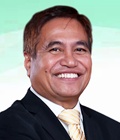Paglambo Project:
Promoting financial inclusion for Muslim communities
 By
JAIME ARISTOTLE B. ALIP,
PhD
By
JAIME ARISTOTLE B. ALIP,
PhD
July 11, 2022
President Ferdinand
Marcos, Jr. has declared July 9 a regular holiday in observance of
Eid al-Adha (Feast of Sacrifice), one of the two greatest Islam
holidays. Eid al-Adha marks the end of hajj, a key pillar of Islam
that able-bodied Muslims must undertake at least once in their
lives. This observance of an important holiday for our Muslim
brothers and sisters is good for inclusive development. Islam is
practiced by roughly five percent of Filipinos from a variety of
ethnolinguistic groups, over half of whom live in Mindanao.
Beyond the observance of
holidays, however, is a serious need for the government to address
the poverty situation in Muslim communities. The three poorest
provinces in the country are predominantly Muslim. Based on the 2018
Family Income and Expenditure Survey (FIES) of the Philippine
Statistics Authority (PSA), the poorest regions are ARMM, Region 9,
Region 8, CARAGA, and Region 12. Four of these regions are in
Mindanao, but the most impoverished is the Bangsamoro Autonomous
Region, which has a poverty incidence of 61.3 percent. This means
that three out of every five persons in the region are poor. The
situation is even worse in the provinces of Lanao del Sur, Sulu, and
Basilan, where nearly two out of every three people are poor.
Financially Excluded
According to the Bangko
Sentral ng Pilipinas (BSP), about 7 in 10 adult Filipinos are
financially excluded and do not have accounts, or access to
much-needed financial services. Financial exclusion affects millions
of Filipinos in the lower income class, the youth, the unemployed,
and the less educated. Financial exclusion is also prevalent among
senior citizens, migrant workers and their families, persons with
disabilities, indigenous peoples, forcibly displaced persons, and
others who are unable to get access to finance due to their
religious beliefs.
There is a religious and
cultural dimension to the issue of Muslim Filipinos’ lack of access
to financial services which could help raise their productivity and
standard of living. Sharīʿah (also spelled sharia) is the Islamic
religious law that governs the day-to-day life of Muslims. The
sharia prohibits interest charging, as this equates with usury (riba).
It forbids speculative transactions involving risks (gharar), and
avoids transactions on sinful things (haram), such as pork, alcohol
and gambling. These tenets limit Muslims’ participation in the
formal financial system.
A truly inclusive
financial system necessitates sharia-compliant financial services
for Muslims. This is problematic because there is only one Islamic
bank in the country, the Al-Amanah Islamic Investment Bank. In the
meantime, a few microfinance institutions (coops and NGOs in
Mindanao) supported by Peace and Equity Foundation; the ASA
Philippines Foundation; and the Center for Agriculture and Rural
Development (CARD) are filling in the gap, making banking, credit,
microinsurance, remittance, and other financial services available
to Muslim communities.
The Paglambo Project
The Paglambo Project is a
sharia-inspired microfinancing program that CARD started in 2018. It
resulted from a series of dialogues and learning visits between two
Ramon Magsaysay awardees: the Dompet Dhuafa, an Indonesian
non-profit organization, which won the Magsaysay Award in 2016, and
CARD MRI, which won the Magsaysay Award for Public Service in 2008.
CARD developed the Paglambo Project based on the Dompet Dhuafa’s
successful Islamic microfinance and banking scheme in Indonesia.
Starting with only two
units composed of clients from 56 Muslim families in Marawi, Lanao
del Sur and Shariff Aguak, Maguindanao, the Paglambo Project
expanded quickly. Attesting to the urgent need for financing in the
area, clients grew to more than 4,000 after only a year of
operation. As of June 2022, the Paglambo Project has 54 units in
Lanao del Sur, Maguindanao, Zamboanga City, Basilan and Tawi-Tawi.
There are now more than 76,000 clients, with a capital build-up of
more than 164 million pesos. Their average loan repayment rate is
very high, at 99.35 percent. In 2021, its unit in Kapatagan,
Maguindanao had a 100% repayment rate despite the COVID pandemic.
Sharia-Compliant
The success of the project
lies in its sharia-compliant financial products and services. For
instance, it has an education loan program based on Islam’s
Murabahah. The Murabahah concept allows the borrower to obtain money
from the lender to buy goods for his business. The parties agree on
the mark-up on the goods, thus, the lender gets a fixed profit based
on the agreement. This eliminates the interest system, which Islam
prohibits. A Kafalah Islamic contract was added to the existing
financing contract, since many Muslim families also needed funds for
their children’s school expenses.
Apart from designing
financial products suited to the needs of the community, all staff
are trained to observe cultural sensitivity. Courtesy calls to
Muslim elders were made to introduce the program, as well as
coordination with village leaders and local organizations.
Communication was key, as attested by the manager in Kapatagan,
whose unit clients grew because she was able to explain that the
financial products under Paglambo is halal or in accord with the
Islamic faith.
The Paglambo Project shows
that financial inclusion in Muslim areas is possible via Islamic
microfinance. The government can assist community-based
organizations that deliver sharia-compliant products by putting up
needed infrastructure to make hard-to-reach areas accessible. Apart
from providing more funds for financial services targeting the poor
and vulnerable, it could also set aside Islamic financing to help
micro, small and medium enterprises (MSMEs) offering halal products
and services. Partnerships between public and private providers
should be encouraged, to serve more Muslim communities.
Again, Eid al-Adha Mubarak
to our Muslim brothers and sister! Wishing your families peace,
harmony, happiness, good health and prosperity!